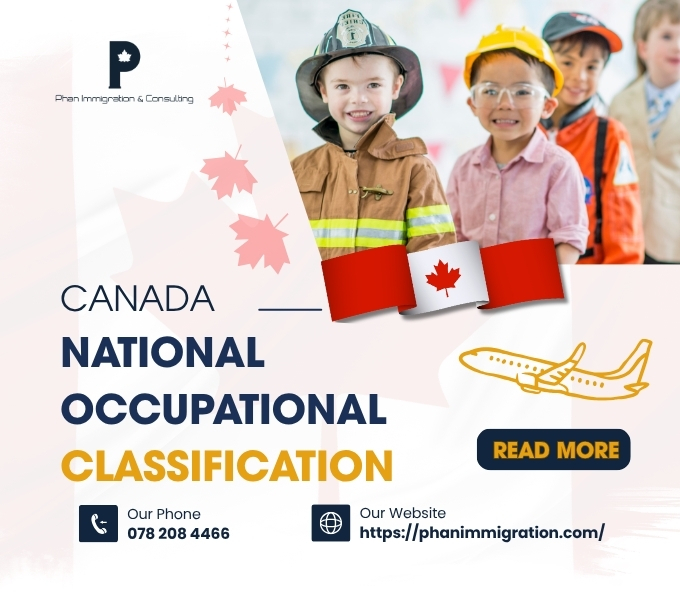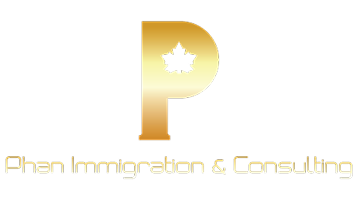Are you looking for an ideal study abroad destination that offers top-quality education, growth opportunities, and a unique cultural experience? Studying in Canada could be the perfect choice for you. Let’s explore the latest study requirements in Canada and important things you should know.
Why Choose to Study in Canada?
Studying in Canada is a worthwhile option with numerous outstanding benefits—especially for those seeking high-quality education, a safe and multicultural living environment, and strong career development opportunities after graduation. Key advantages of studying in Canada include:
- World-class education: Canada is home to 26 universities listed in the QS World University Rankings 2019 and boasts a high-quality education system. A degree from a Canadian university is a valuable credential that opens up many job opportunities and supports long-term career growth.
- Extensive research opportunities: One of the most distinctive features of Canada’s education system is its strong emphasis on research and development. This makes it an ideal environment for academic researchers. The government also provides significant support for research in fields such as agriculture, medicine, environmental science, telecommunications, and technology.
- Cultural diversity: No matter where you’re from or what your lifestyle is, you will always receive a warm welcome in Canada. Its multicultural environment promotes peaceful living and friendliness, helping you integrate into your new community with ease.
- Affordable tuition fees: One of the great advantages of studying in Canada is that international student tuition fees are generally much lower than in destinations like the U.S., the U.K., Australia, or New Zealand. You can also plan where to study based on budget, as tuition costs vary significantly between provinces. For instance, Manitoba has some of the lowest costs—about half of what you’d pay in British Columbia, the most expensive province.
- Safe and peaceful living environment: Canada consistently ranks among the safest countries in the world. According to the 2018 Global Peace Index, it ranked 6th globally. As an international student, you’ll enjoy the same protections and benefits as Canadian citizens, in a peaceful and secure environment.
- Earn income while studying: The Canadian government allows international students to work up to 20 hours per week during academic sessions and full-time during winter and summer breaks. No separate work permit is needed to work on campus or to take part in internships, as your study permit already authorizes you to work part-time.
- Pathway to permanent residency: Canada offers a Canada Post-Graduation Work Permit Program (PGWPP), which allows international students to stay and work in Canada for up to 3 years after graduation. During this time, you can gain valuable work experience and apply for permanent residency once eligible—without needing to leave the country.

What Are the Requirements for Studying in Canada?
To turn your dream of studying in Canada into reality, you need to understand the essential requirements, including language proficiency, academic qualifications, age, health conditions, financial proof, study permit, and student visa. Details are as follows:
Language Proficiency Requirements for Studying in Canada
Proficiency in English or French is a crucial factor when studying in Canada, as these are the two most widely used languages. Most academic programs and course materials are delivered in English. Therefore, you must have an IELTS certificate that meets the admission standards of your chosen institution. Additionally, language requirements vary depending on the level of study:
| Level of Study | English Language Requirement |
| University Preparation | IELTS 5.0 – 5.5 or higher |
| College | IELTS 5.5 – 6.0 or higher |
| Undergraduate | IELTS 6.0 – 6.5 or higher |
| Postgraduate | IELTS 6.5 – 7.0 or higher |
Note: Each school and program may have different language requirements, so it’s important to check the official website of the institution for the most accurate information.

Financial Proof Requirements
In addition to language proficiency, financial capacity is a key factor when studying in Canada. Currently, there are two pathways for international students: with financial proof or under the financial-proof-exempt stream.
Financial Proof Required
Most levels of study and institutions in Canada require international students to demonstrate that they have sufficient funds to cover tuition fees and living expenses for the first academic year. These costs include:
| Level of Study | Tuition Fees (CAD/year) | Converted to VND/year* |
| High School | 13,000 – 30,000 | 230,882,000 – 532,806,000 |
| College | 12,000 – 18,000 | 213,122,000 – 319,684,000 |
| University | 17,000 – 50,000 | 301,923,000 – 888,011,000 |
| Postgraduate | 18,000 – 25,000 | 319,684,000 – 444,005,000 |
| Living Expenses | 15,000 – 20,000 | 266,403,000 – 355,204,000 |
*Exchange rate as of March 10, 2025
To study in Canada under this stream, international students must provide financial documents to prove:
- A savings account balance sufficient to cover the above-mentioned costs
- The financial sponsor’s minimum monthly income is approximately 50 million VND
- Passive income from assets such as rental contracts (house, land, factory, car), or business income
- Tuition deposits may be paid for one term or the full year, depending on the school’s policy
Study Direct Stream (SDS – Financial Proof Exemption)
Under the SDS stream, students are exempt from providing income documents but must meet the following conditions:
- Be a legal citizen of one of the eligible countries designated by the Canadian government (including Vietnam)
- Hold a letter of acceptance from a Designated Learning Institution (DLI) in Canada and a provincial (or territorial) confirmation letter
- Have an IELTS score of at least 6.0 in all skills or a government-approved equivalent language test
- Provide a receipt for the full payment of first-year tuition
- Present a Guaranteed Investment Certificate (GIC) from a designated Canadian bank with an amount of CAD 20,365, depending on the province or territory of study
However, this program officially stopped accepting applications as of November 9, 2024. This means that Vietnamese students who wish to study in Canada must now follow the regular financial proof process.

Academic and Age Requirements
Depending on the level of study, the Canadian government has specific academic and age requirements for international students:
- For students applying to junior high or high school programs: Must be over 12 years old, with a minimum GPA of 6.5 and English proficiency equivalent to IELTS 5.0.
- For students applying to university foundation (pathway) programs: Must have completed Grade 11 with a GPA above 6.5 and IELTS above 5.0.
- For students applying to college or undergraduate programs:
- Option 1: Must have graduated from high school with a minimum GPA of 6.5 and IELTS of at least 6.0.
- Option 2: Must complete a university foundation program in Canada with the required number of credits before entering a college or university. Generally, at least 70–80% of course credits must be earned.
- For students applying to master’s programs: Must have completed a bachelor’s degree in a relevant major from a recognized institution in their home country. Some institutions, especially those offering specialized programs, may require additional certifications such as GMAT or GRE, a minimum GPA above 7.0, and an IELTS score of at least 6.5.
Health Requirements for Studying in Canada
Health is another important factor for studying in Canada. International students are required to undergo a medical examination at a designated medical center (typically IOM or Care 1 Canada) and submit the results with their application. The health check process is as follows:
- Schedule an appointment at a clinic authorized by the Canadian Consulate.
- Fill out the required personal information form.
- Bring the following documents to your appointment:
- Passport
- IMM 1017 E Medical Form (with a portrait photo attached in the top-right corner as required)
- Personal photographs and the medical examination fee
- Visit the designated clinic and complete the medical check-up as instructed.

Study Permit and Student Visa Are Required
Finally, you must obtain a Study Permit and student visa to be allowed to study in Canada. For Vietnamese students, when your Study Permit application is approved, you will typically receive a Canada student visa at the same time.
To be granted a Study Permit, you must demonstrate to Canadian immigration authorities that you meet the following requirements:
- Academic requirement: An official Letter of Acceptance (LOA) from a Designated Learning Institution (DLI) and a letter from the province or territory where you will study. If you plan to study in Quebec, you must also meet specific Quebec Immigration Requirements, including obtaining a CAQ (Certificat d’acceptation du Québec) before applying for your study permit.
- Financial proof: Documents showing you have sufficient funds to cover tuition, living expenses, and travel costs for yourself and accompanying family members (if any).
- Legal eligibility: A clean criminal record, compliance with Canadian laws, and a police certificate (if requested).
- Health requirement: Good health and, if requested, a completed medical examination.
- Intent to leave: A declaration that you will leave Canada once your Study Permit expires.
In addition, you must prepare the following documents to present at the Canadian border to receive your Study Permit:
- A valid passport with a Canada visa
- Proof of tuition payment (receipt)
- Letter of Acceptance (LOA) from your chosen school
- Letter of Introduction (LOI) from the Canadian Embassy
How to Receive Your Canadian Study Permit:
- If applying from Vietnam: Once your application is approved, you will receive a Letter of Introduction to present at immigration when arriving in Canada.
- If applying from within Canada: Your Study Permit will be mailed to you.
For Vietnamese students, you must submit your passport to receive the visa and carry the Port of Entry (POE) Letter when arriving in Canada. At the point of entry, present all required documents to the immigration officer. If everything is valid, you will be issued your official Study Permit upon arrival.
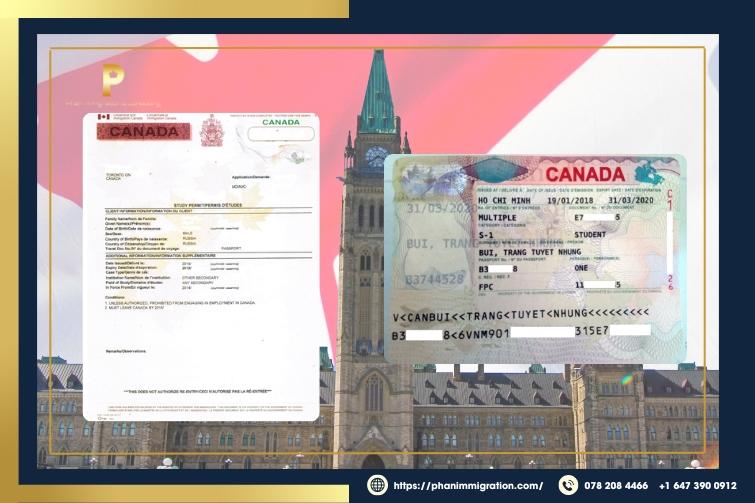
Phan Immigration – A Professional and Dedicated Canada Study Abroad Consultancy
Licensed by the Government of Canada, Phan Immigration is a trusted immigration consultancy specializing in tailored immigration solutions for each individual. As a reliable bridge between Vietnam and Canada, we are committed to providing safe, efficient, and cost-optimized immigration pathways. Beyond helping clients achieve their immigration goals, Phan Immigration also supports you in building a stable life, advancing your career, and shaping a strong future in beautiful Canada.
Why Choose Phan Immigration?
- Certified and Experienced Experts: With over 15 years of in-depth experience in Canadian immigration consulting, our team of licensed professionals—recognized by the College of Immigration and Citizenship Consultants (CICC)—is dedicated to delivering reliable, professional, and client-focused services.
- Personalized and Comprehensive Solutions: Phan Immigration offers a wide range of services, from short-term visas (study, tourism, business) to long-term immigration programs (Express Entry, Provincial Nominee Program, family sponsorship), ensuring that all advice is tailored to your specific goals and situation.
- Strong and Reputable Partner Network: We maintain long-standing partnerships with leading immigration lawyers, business attorneys, and reputable Canadian enterprises to help clients integrate smoothly into their new communities.
- Transparency and Accountability: We uphold the highest standards of integrity, providing clear and honest information while taking full responsibility throughout every stage of the application process.
Our Canada Provincial Immigration Services Include:
Investor Immigration Programs:
- Start-Up Visa (SUV)
- Provincial Investment Programs (Alberta, Saskatchewan, New Brunswick, PEI, etc.)
- Intra-Company Transfer (ICT)
- Significant Benefit Work Permit (C11)
- T50 Program
Skilled Worker Immigration:
- Provincial Nominee Programs (PNPs) (Alberta, Saskatchewan, New Brunswick, PEI, etc.)
- Atlantic Immigration Program (AIP)
Study-Based Immigration Pathways: Comprehensive legal support for programs including Express Entry, PNPs, Labour Market Impact Assessment (LMIA), Open Work Permits, and Spousal Sponsorship.
At Phan Immigration, we are committed to delivering the highest quality service to help you achieve your immigration goals quickly and successfully. If you have any questions about studying in Canada or other Canadian immigration programs, don’t hesitate to contact Phan Immigration today for expert guidance and dedicated support.

FAQs About Studying in Canada
Is it easy to get a scholarship to study in Canada?
Getting a scholarship to study in Canada is challenging due to strong competition and strict selection criteria. However, with excellent grades, strong English skills, a persuasive personal statement, and early, well-prepared applications, you can increase your chances.
Top Canadian scholarships include:
- York University Scholarship: Up to CAD 180,000
- University of Alberta (President’s International Distinction): Up to CAD 120,000
- Simon Fraser University Scholarship: Up to CAD 140,000+
- Queen’s University Scholarship: Up to CAD 100,000
What are the best programs to study in Canada?
Canada offers high-quality education across all fields, but choosing programs in high-demand sectors can improve job prospects and eligibility for a post-graduate work permit (up to 3 years). Select a program that matches your strengths and career goals for the best outcomes.
Top programs for international students:
- Business and Management
- Computer Science and Information Technology
- Engineering
- Health Sciences and Medicine
- Social Sciences and Humanities
What Is the Minimum Age to Study in Canada?
Age requirements for studying in Canada depend on the level of education you plan to pursue. Generally, for secondary education, international students are required to be under 18 years old. For college, university, or postgraduate studies, students must be at least 18 years of age or older.
What Is the Required IELTS Score for Studying in Canada?
There is no fixed IELTS score that applies to all study programs in Canada. IELTS requirements vary depending on the level of study, academic program, institution, and specific admission criteria. However, you can refer to the typical IELTS score ranges below:
- Undergraduate Programs: IELTS 6.0 – 6.5
- College Programs: IELTS 5.5 – 6.0
- Postgraduate Programs: IELTS 6.5 – 7.0
- University Preparation/Foundation Programs: IELTS 4.5 – 5.5
- High School: Students may take an entrance test or have English proficiency equivalent to IELTS 4.5 – 5.5
Phan Immigration has now provided a detailed overview of the latest requirements for studying in Canada, along with key information to help you start your study abroad plan. If you’re interested in studying in Canada and don’t know where to begin, don’t hesitate to contact Phan Immigration for expert consultation and personalized guidance.

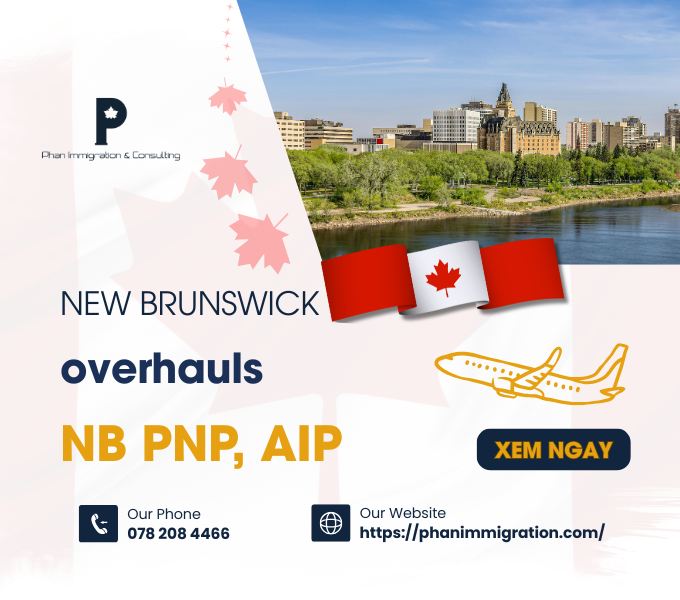
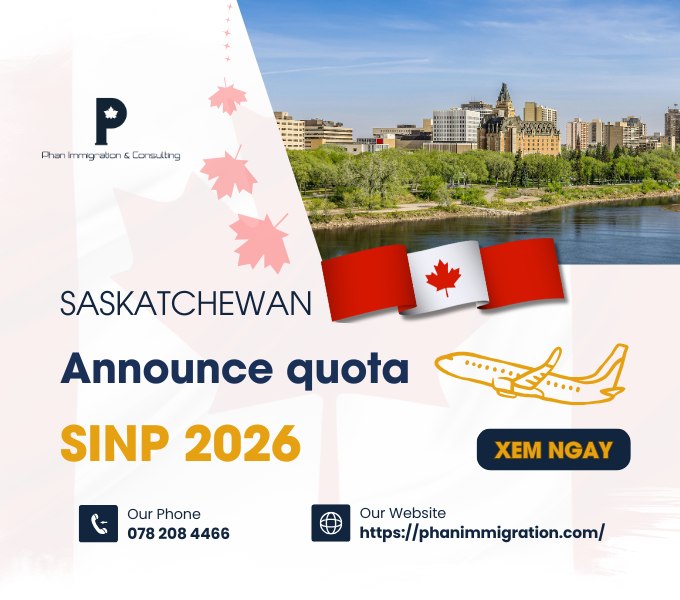
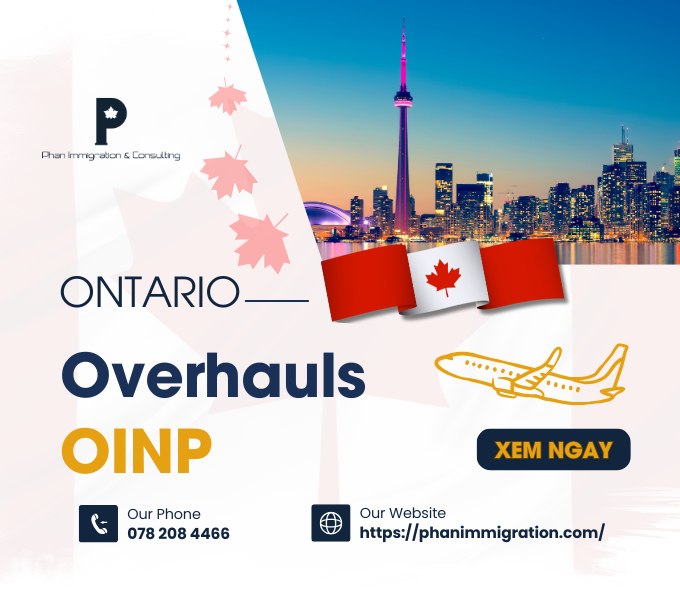
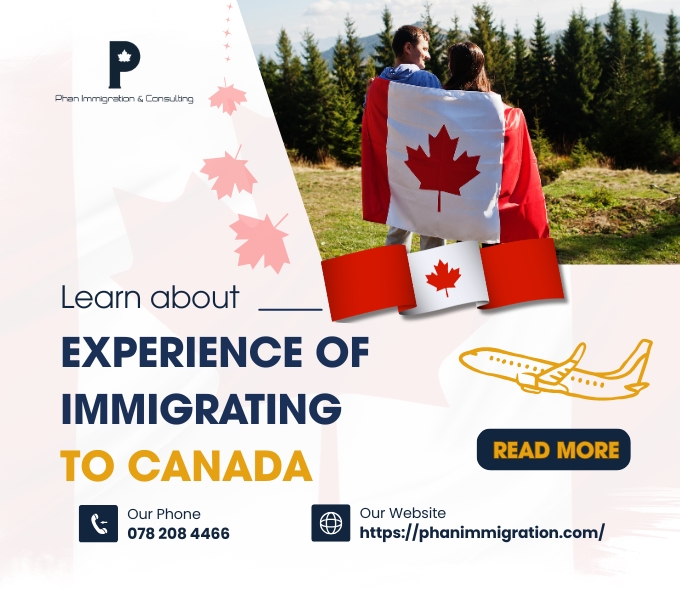
![[Phan Immigration Answers] How Much Money Can You Bring When Immigrating to Canada?](https://phanimmigration.com/wp-content/uploads/2025/06/how-much-money-can-you-bring-when-immigrating-to-canada-thumbnail.jpg)
